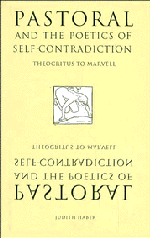Book contents
- Frontmatter
- Contents
- Acknowledgments
- Texts and abbreviations
- Introduction: “Remedies themselves complain”: pastoral poetry, pastoral criticism
- 1 Bringing it all back home: bucolic and heroic in Theocritus' Idylls
- 2 Si numquam fallit imago: Virgil's revision of Theocritus
- 3 Pastime and passion: the impasse in the Old Arcadia
- 4 Complaints themselves remedy: Marvell's lyrics as problem and solution
- Epilogue Farewell to pastoral: The Shepherd's Week
- Notes
- Works cited
- Index
2 - Si numquam fallit imago: Virgil's revision of Theocritus
Published online by Cambridge University Press: 17 August 2009
- Frontmatter
- Contents
- Acknowledgments
- Texts and abbreviations
- Introduction: “Remedies themselves complain”: pastoral poetry, pastoral criticism
- 1 Bringing it all back home: bucolic and heroic in Theocritus' Idylls
- 2 Si numquam fallit imago: Virgil's revision of Theocritus
- 3 Pastime and passion: the impasse in the Old Arcadia
- 4 Complaints themselves remedy: Marvell's lyrics as problem and solution
- Epilogue Farewell to pastoral: The Shepherd's Week
- Notes
- Works cited
- Index
Summary
Virgil clearly understood the paradoxical irony at the heart of the Idylls; he invokes it, for example, at the end of Eclogue 7. Corydon, the more perfectly “bucolic” of a pair of herdsmen competing in a song-contest, triumphs over his pseudo-heroic partner; he becomes, as a result, the self-defining hero of pastoral song:
ex illo Corydon Corydon est tempore nobis.
(70)From then on, it's been Corin, Corin with us.
There are, however, several important differences between Virgil's poetry and that of his predecessor, and these helped shape the course of Renaissance pastoral. The most important – arising in part from the simple fact that Theocritus was Virgil's predecessor – becomes immediately apparent when we read the first lines of the Eclogues:
Tityre, tu patulae recubans sub tegmine fagi
silvestrem tenui musam meditaris avena;
nos patriae finis et dulcia linquimus arva.
nos patriam fugimus; tu, Tityre, lentus in umbra
formosam resonare doces Amaryllida silvas.
(1–5)You, Tityrus, under the spreading, sheltering beech,
Tune woodland musings on a delicate reed;
We flee our country's borders, our sweet fields,
Abandon home; you, lazing in the shade,
Make woods resound with lovely Amaryllis.
If Theocritus, throughout his Idylls, was bringing heroism back home, Virgil is now confronting us with the loss of home and all that it represents. The Roman poet clearly views his own era not only as more limited than that of his model, but also as more turbulent and unsettled.
- Type
- Chapter
- Information
- Pastoral and the Poetics of Self-ContradictionTheocritus to Marvell, pp. 36 - 52Publisher: Cambridge University PressPrint publication year: 1995



